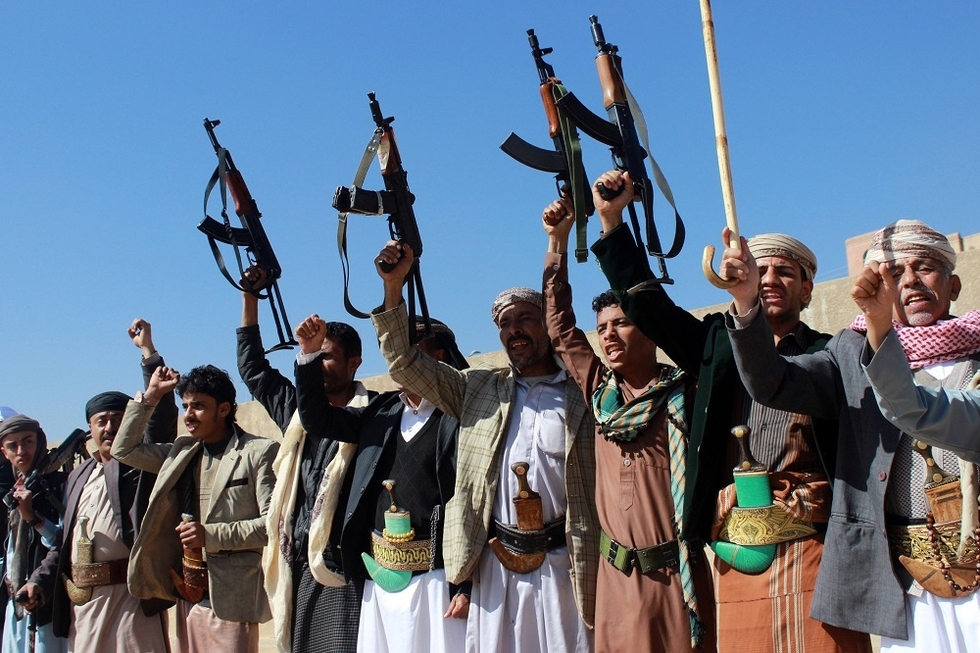Fighting rocks Yemen as peace deal teeters on brink: Reports

AL MUKALLA, Yemen - Fierce clashes and air strikes have continued to rock Yemen despite delegates still being locked into ongoing peace talks in Switzerland and a ceasefire officially supposed to be in effect.
Combat escalated between the warring sides on Thursday as forces loyal to Yemeni President Abd Rabbuh Mansour Hadi seized a key military base from Houthi fighters in the central city of Marib, local officials and tribesmen told Reuters.
According to the sources, 15 people were killed on both sides. Fighting was also reported further to the north, in the border province of Jawf, Yemeni sources told MEE.
Saudi-led military coalition planes and gunboats also reportedly bombed targets in northern Yemen, local residents said.
The latest escalations have helped fuel speculation that UN-backed peace talks may be on the verge of collapse, with delegates also struggling to reach a compromise on a prisoner swap between the two sides.
The talks kicked off on Tuesday morning, with a ceasefire also taking effect, but the negotiations have since been marred by reports of violations on the ground.
MEE's Nawal al-Maghafi is in Switzerland at the talks and gave an update on Thursday afternoon about how the thorny negotiations are progressing, if at all.
While residents in the south-west city of Taiz have reported the worst fighting with near constant air strikes from the Saudi-backed coalition and shelling from the Houthis battering the city, the fighting has also touched other parts of Yemen in recent days.
On Wednesday, the northern Yemeni province of Hajjah saw fierce clashes between pro-government troops and the Houthis
Government officials and local journalists told Middle East Eye that a large number of pro-government troops, who had recently been trained in Saudi Arabia, had launched an attack on Houthi-controlled Haradh and Medi districts in the borderline with Saudi Arabia. Conflicting accounts have emerged about which faction managed to seize the most ground.
A journalist from Hajjah province, who spoke on condition of anonymity, said that pro-government troops advanced deeply into the Yemeni side of the border taking control of the main border crossing and a small area near the city of Haradh.
“The Yemeni forces marched from the Saudi border under heavy cover from the Saudi warplanes. The retreating Houthi responded by deploying snipers in the city to roll back their opponents’ advance,” the journalist said.
But a government official who used to work at the Haradh border crossing told MEE that the Houthis managed to repel the attack.
“Ansar Allah [the Houthis] are in control of the border crossing. They even launched an attack on Wednesday on the Saudi forces on the other side of the border,” said the government official who spoke anonymously for fear of reprisal.
Since the beginning of Saudi-led bombing operation on Houthis in March, the poverty-stricken Hajja province has been hit hard by hundreds of ruthless air strikes. Saudi Arabia claims that the Houthis and their allied forces have used the border areas as a base for launching rocket attacks on Saudi villages.
“The cities of Haradh, Abes and Midi have been under daily bombing by the Saudi jets and cannons since March. They destroyed most of the city’s hotels, schools and bridges. The warplanes hit any car that they suspect of carrying Houthi fighters,” the official said.
The Houthis seized the capital Sanaa in September. Despite UN mediation efforts they failed to disarm and at the start of this year placed Yemeni President Hadi under house arrest. While Hadi was able to flee south, the Houthis and their Yemeni allies – largely loyal to former president Ali Abdullah Saleh – marched south seizing vast swathes of Yemen.
Riyadh formed an Arab-dominated coalition to roll back the Houthi advance in March, but while the summer saw the Houthis and their allies retreat from the southern capital Aden, a stalemate seems to have developed on the ground, with al-Qaeda in the Arabian Peninsula (AQAP) and the Islamic State group taking advantage of the political vacuum.
Additional reporting by MEE staff in London and Switzerland
Middle East Eye propose une couverture et une analyse indépendantes et incomparables du Moyen-Orient, de l’Afrique du Nord et d’autres régions du monde. Pour en savoir plus sur la reprise de ce contenu et les frais qui s’appliquent, veuillez remplir ce formulaire [en anglais]. Pour en savoir plus sur MEE, cliquez ici [en anglais].




